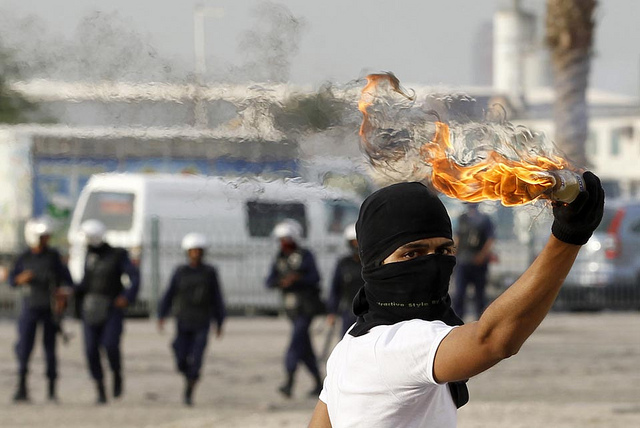In 1966, African-American civil rights leader Julian Bond won election to the Georgia House of Representatives. However, his white colleagues refused to allow him to take his seat. He had participated in peaceful demonstrations as a member of the Student Non-Violent Coordinating Committee (SNCC), which also opposed the Vietnam War. Because of membership in that radical group, they said, he should not be allowed to take his legislative seat.
Fast forward to modern-day Bahrain. The country has experienced a largely peaceful uprising for the past two years with people demanding civil and political rights. The city council of Muharraq, Bahrain, voted to expel five of its elected members. They had signed a petition to the UN criticizing Bahrain's monarchy and had participated in peaceful demonstrations. The sacked councilmen were all members of the Al Wefaq Islamic Society, the country's largest opposition group.
The political logic of the Royal Kingdom of Bahrain and the State of Georgia are strikingly similar. In the 1960s many Georgians felt threatened by the scourge of communism. By their reckoning, the civil rights movement pretended to be non-violent but was really controlled by evil communists from the USSR and Red China. The Georgia House of Representatives was merely protecting itself from the communist menace by refusing to allow the devil to enter its chambers.
Today some in Bahrain believe they are facing a similar "terrorist menace." As they see it, Al Wefaq pretends to be non-violent but really seeks to impose an Iranian-style Islamic dictatorship on Bahrain. So the Muharraq city council, like its Georgia counterpart, considered itself justified in expelling the elected representatives of Al Wefaq.
Admittedly, their expulsion has caused difficulties for residents. The city hasn't replaced the five city council members because of popular outrage at their firing. Even the pro-monarchist chair of the city council laments the fact that their constituents have been without representation for over a year.
Municipal Council chairman Abdulrazzak Al Hattab admitted to a local newspaper that he's had a "change of heart" about the firings. "We have come up with the idea to re-vote our colleagues back, and we are just waiting for the legal aspect and to find out whether the original court verdict could be thrown out with our new vote," he told the Gulf Daily News.
The Muharraq Five lost their initial court case but have appealed and are awaiting the decision of a higher court. The city council has not actually taken a vote to re-instate the sacked council members.
Bahraini officials should take note of what happened in Georgia. Lower courts in the US ruled against Julian Bond, and he had to take his case all the way to the Supreme Court. The high court ruled that Bond's free speech rights had been violated.
Bahrain's courts are far from independent. So far the courts have upheld verdicts issued by military tribunals, even in cases involving illegal detention and torture. But Bahraini officials might note that today's opposition "terrorist" is tomorrow's national leader.
After Julian Bond took his legislative seat, he won re-election and had a distinguished, eight-year career in the state legislature.
Main Menu Navigation


